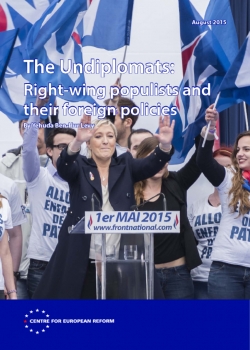
The Undiplomats: Right-wing populists and their foreign policies
- As right-wing populist parties have shifted from being marginal players to important political actors in Europe, they have also turned their attention from domestic to foreign and security policy, in ways that sometimes threaten European interests. Mainstream parties need to find effective ways to counter them.
- Right-wing populist parties disagree on many foreign policy issues. They range from anti-American to pro-American, from Russophile to Russosceptic and from isolationist to internationalist. But they are united on some points, notably euroscepticism. They oppose further EU enlargement and, especially, Turkish membership of the EU.
- Populist parties, especially of the right, are strongly represented in some national parliaments, and did well in the May 2014 European Parliament elections. They have used a variety of strategies to try to influence foreign policies. At the national level, they have sought to maximise their influence through formal or informal deals with mainstream parties; but their voters have sometimes punished them for getting too close to the mainstream. At the EU level, they have struggled to use parliamentary processes to maximum advantage, but the formation of a new group of populists in the European Parliament, centred on France’s Front National, shows that they are learning how to play the game.
- Whether they are in government or in opposition, populist parties can complicate the process of forming EU foreign policy. They may undermine mainstream consensus on how to react to international events, thereby weakening Europe’s voice abroad and limiting its capacity to respond to global challenges. That is why foreign governments, including Russia, make a priority of cultivating ties with some of these parties.
- Mainstream parties have tried to contain the popularity of the populists by ignoring them (unwise if they are winning a significant share of the vote) or trying to copy their policies (unconvincing to voters, who see such imitation as insincere). This policy brief looks at more effective ways to counter populists:
- The best strategy for mainstream parties is to address the issues that voters worry about, for which populist parties claim to have simple answers, but to find better solutions. This applies as much to foreign policy-making, including at the EU level, as it does to domestic issues.
- If the electoral arithmetic leads mainstream parties to co-operate with populists, the former need to set clear red lines on foreign policy. Foreign policy should not become a bargaining chip in coalition negotiations, and every effort should be made to preserve coherent national and European foreign and security policies.
- Voters need to understand who influences the parties they vote for. The problem of opaque party funding is not limited to the populist parties; but the fact that such parties are often relatively young and lack the long-term funding base of the mainstream parties may open the way for foreign states and non-state actors to buy influence. Russia in particular has tried to convert financial aid for populist parties into Russia-sympathetic policies. European governments should make party funding more transparent.
Yehuda Ben-Hur Levy was the Clara Marina O’Donnell memorial fellow (September 2014-March 2015).
Copyright is held by the Centre for European Reform. You may not copy, reproduce, republish or circulate in any way the content from this publication except for your own personal and non-commercial use. Any other use requires the prior written permission of the Centre for European Reform.

